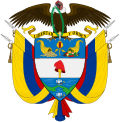| |||||||||||||||||
| |||||||||||||||||
 Winner by department | |||||||||||||||||
| |||||||||||||||||
| This article is part of a series on the |
| Politics of Colombia |
|---|
 |
Presidential elections were held in Colombia on 25 May 1986. [1] The result was a victory for Virgilio Barco Vargas of the Liberal Party, who received 58% of the vote.
Contents
Barco Vargas' campaign promised land reform and economic revitalization, including jobs and housing for the poor. [2] One of the issues in the campaign was the ongoing negotiations with Colombian guerilla groups. [2]
The elections took place shortly after the March 1986 parliamentary elections, in which Barco Vargas' Liberal Party won a majority of seats. [2]

